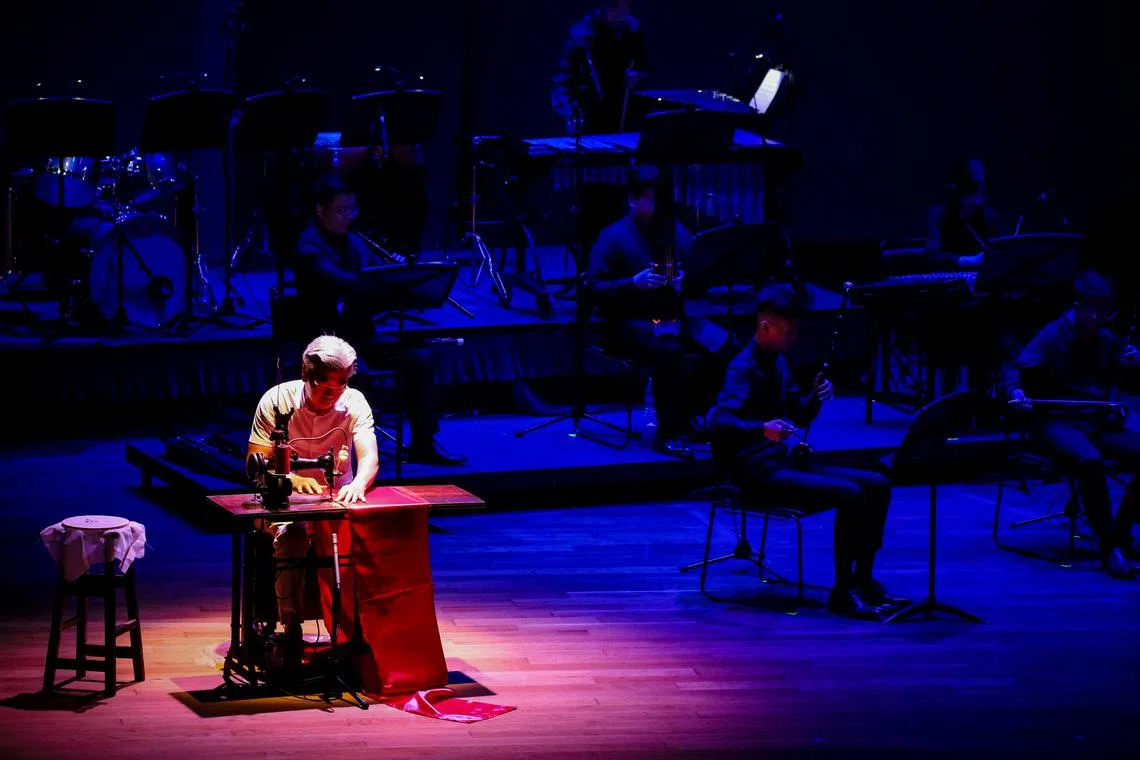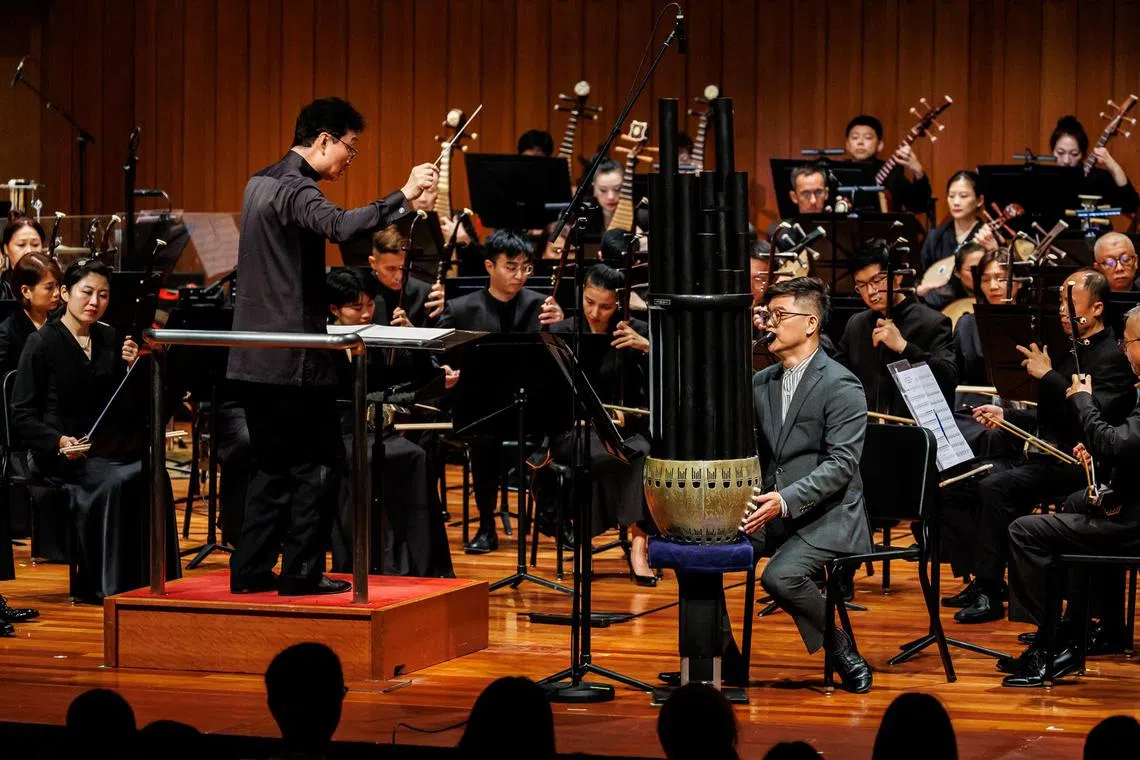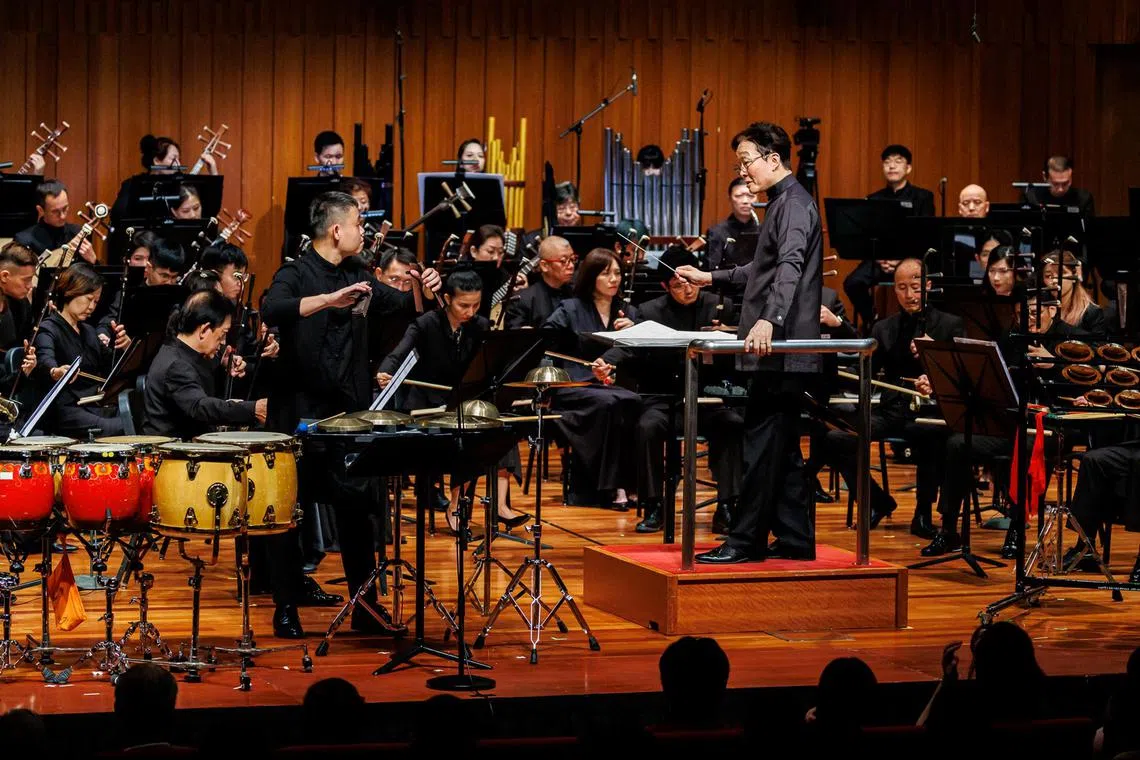Concert review: Ding Yi and Singapore Chinese Orchestra highlight home-grown composers in two concerts
Sign up now: Get ST's newsletters delivered to your inbox

Third-generation artisan Jeffrey Eng's Singer sewing machine was incorporated into the orchestral score by Ding Yi's composer-in-residence Jon Lin Chua.
PHOTO: ANDREW BI PHOTOGRAPHY
Intimate Intricacies
Ding Yi Music Company
Singapore Chinese Cultural Centre
Last Saturday, 3.30pm
For Our Dreams: Wang Chenwei’s Composition Showcase
Singapore Chinese Orchestra
Last Saturday, 7.30pm
Two concerts featured three young Singaporean composers within a single day. It appears that Chinese instrumental ensembles are doing the heavy lifting when it comes to promoting home-grown composer talents.
The first concert conducted by Quek Ling Kiong was a project commissioned by Ding Yi Music Company, part of its Disappearing... series of programmes documenting the plight of Chinese cultural heritage at risk of being lost forever.
In an hour-long film scripted by Jesvin Yeo and directed by Eric Wong, the subjects of giant joss stick-making and Teochew embroidery were sensitively handled in the orchestral scores Scent Of Reminiscence by Liong Kit Yeng and Iridescent Threads respectively by Ding Yi composer-in-residence Jon Lin Chua.
The preludes – Liong’s Handicrafts and Chua’s Heartcrafts – were easily relatable and created the right mood for recounting poignant personal stories of third-generation artisans Albert Tay and Jeffrey Eng.
In the case of Tay’s family business (Tay Guan Heng), this narrative came too late as secularism, anti-pollution laws and family bereavement had contrived to make his giant joss sticks craft obsolete. A rebirth was, however, represented by the incense recycled as incense-infused pottery by artist Oh Chai Hoo.
More fortunate were Eng’s embroidery endeavours, the comforting clatter of his trusty Singer sewing machine being skilfully dovetailed into Chua’s music with Yvonne Tay’s guzheng providing a mirror-like counterpoint.
Moments like this and the optimistic end credits titled Friendship provided hope that when people choose to remember, not all is lost.
The second concert, led by conductor emeritus Yeh Tsung, featured four home-grown premieres by Singapore Chinese Orchestra composer-in-residence Wang Chenwei.
The mind boggled at how these very accessible works had never previously been heard here. For Our Dreams (2021) made for a rousing opener with a big central melody that resembled a cross between Scottish folksong O Waly, Waly and a National Day Parade crowd-pleaser.
Wang is credited with composing music’s first virtuoso concerto for the diyin sheng, possibly the mouth organ with the world’s largest pipes.

In the concert conducted by Yeh Tsung, diyin sheng soloist Lim Kiong Pin produced a deep bellowing sonority capable of an astonishing degree of agility.
PHOTO: SINGAPORE CHINESE ORCHESTRA
Taoyuan Wonderland (2020) featured soloist Lim Kiong Pin, who produced a deep bellowing sonority capable of an astonishing degree of agility. Its four short movements depicted picturesque scenes in Taiwan, with a recurring melody redolent of I Saw Mummy Kissing Santa Claus.
Postcards From Macao (2019) was a prime example of how to effectively write a musical travelogue. Its movements A-Ma Temple, Mount Fortress and Senado Square incorporated both Chinese idioms and Portuguese influences from the territory’s colonial history.
The Portuguese term saudade, connoting nostalgic sadness and yearning, was eloquently expressed in a musical language common to both Eastern and Western viewpoints.

Wang Chenwei's Concerto For Chinese Percussion gave soloist Benjamin Boo a chance to show off his mastery of a sprawling array of drums, cymbals, bells, gongs and bamboo clappers.
PHOTO: SINGAPORE CHINESE ORCHESTRA
The evening’s most impressive work was Wang’s Concerto For Chinese Percussion (2019), also titled Bronze Age Of Shang, with Benjamin Boo clearly relishing his virtuoso solo role.
The three bronze objects referred to – a battle axe, a wine vessel and a ritual cauldron – represented the forging of a definitive Chinese identity in its first dynasty, circa 2000BC.
Boo’s mastery of a sprawling array of drums, cymbals, bells, gongs and bamboo clappers – a daunting feat of multitasking – brought out the longest and loudest plaudits.
As the complete opposite of unfamiliarity, the upbeat encore Dauntless was likely – thanks to school competitions – the most-played Chinese orchestral work in the land. And for good reason too, as Wang’s craft of fashioning tunes and rhythms was totally infectious.


